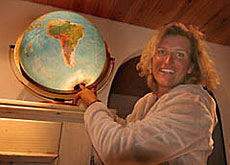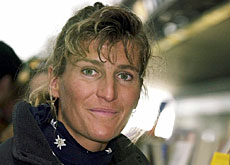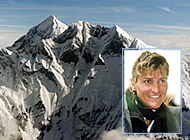Binsack plans odyssey to the South Pole

Evelyne Binsack, the first Swiss woman to climb Everest, is about to undertake an epic new challenge - a 16-month solo expedition from Switzerland to the South Pole.
In an interview with swissinfo ahead of her departure on “Expedition Antarctica”, Binsack, who is more used to scaling mountain peaks, talks about her search for new goals.
On September 1 the 39-year-old mountaineer and helicopter pilot will set off on her bicycle from the Bernese Oberland to Antarctica. Her 28,000-km journey over land and ice will take her via Morocco, the United States, and Central and South America.
swissinfo: On May 23 2001, you became the first Swiss woman to climb Everest. You are now planning a solo expedition from Switzerland to the South Pole. Where did your inspiration for this adventure come from?
Evelyne Binsack: The idea first came to me after I returned from Everest five years ago. My plan is to reach the highest, most northerly and southerly points of the planet – Mount Everest, and the North and South Poles.
My intention was to start with a solo expedition to the North Pole. But when I visited the Arctic region on a training session, I realised that I didn’t really know enough about water and ice, so I decided to do things this way round and go to the South Pole first.
swissinfo: How would you describe yourself?
E.B.: I enjoy freedom and independence. I’m also someone who’s constantly on the move. I like to push boundaries and learn new things about and from nature. Up to now my focus has been the mountains, but with this trip it’s going to be more about the desert.
swissinfo: Why are you starting from Switzerland?
E.B.: I want to establish a clear link in people’s minds between Switzerland and the South Pole and involve various groups of people in the expedition such as climatologists and Swiss people working in South America.
swissinfo: Your expedition is more than just a sporting adventure; it also has a social aspect to it. What are its charitable objectives?
E.B.: I’ve been working together with the charity SOS Children’s Villages. The aim is to use the expedition to raise funds for their projects in Nicaragua, where they are involved in building orphanages.
swissinfo: What kind of special training have you been doing for this expedition?
E.B.: For me training is a daily activity – like eating, sleeping and drinking. I don’t really like the word “training”, which sounds so serious; I prefer “activity”. I do various activities outdoors between two and five hours a day such as mountain biking, rock-climbing or simply working out.
swissinfo: Is the expedition at all risky? What are your chances of failure?
E.B.: I’m slightly concerned about the political situation in some of the countries. I’m also a very open person and sometimes being too open can put you in a vulnerable position. I only hope that I am intuitive enough to know when to trust people.
At the South Pole the biggest risk will be dealing with the cold. But as I’ve already carried out two training sessions in the Arctic region, I hope that I’ll be fit enough and sufficiently prepared.
swissinfo-interview: Simon Bradley
Evelyne Binsack’s 28,000-km journey to the South Pole from Switzerland will begin on September 1, 2006.
She plans to cycle from Switzerland via Morocco (November 2006), the United States (November 2006-January 2007), Central America (January-February 2007) and South America (February-November) to Punta Arenas in Chile.
Binsack will then fly to Patriot Hills in Antarctica from where she will begin a 1,100-trek on skis to the South Pole (expected arrival January 2008).
Evelyne Binsack was born in 1967 and currently lives in Innertkirchen, a village in the Bernese Alps.
She has climbed the north face of the Eiger three times, including a winter ascent.
Binsack became the first Swiss woman to conquer Everest on May 23, 2001.
It came 55 years after Jürg Marmet became the first Swiss man to reach the top of the world.

In compliance with the JTI standards
More: SWI swissinfo.ch certified by the Journalism Trust Initiative



You can find an overview of ongoing debates with our journalists here. Please join us!
If you want to start a conversation about a topic raised in this article or want to report factual errors, email us at english@swissinfo.ch.